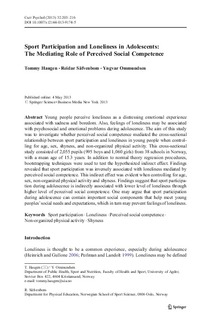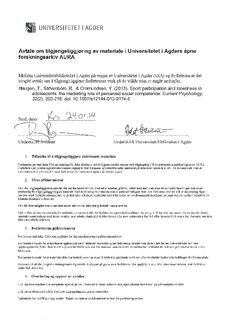| dc.contributor.author | Haugen, Tommy | |
| dc.contributor.author | Säfvenbom, Reidar | |
| dc.contributor.author | Ommundsen, Yngvar | |
| dc.date.accessioned | 2014-01-24T08:48:55Z | |
| dc.date.available | 2014-01-24T08:48:55Z | |
| dc.date.issued | 2013 | |
| dc.identifier.citation | Haugen, T., Säfvenbom, R., & Ommundsen, Y. (2013). Sport participation and loneliness in adolescents: the mediating role of perceived social competence. Current Psychology, 32(2), 203-216. doi: 10.1007/s12144-013-9174-5 | no_NO |
| dc.identifier.issn | 1046-1310 | |
| dc.identifier.uri | http://hdl.handle.net/11250/139076 | |
| dc.description | Published version of an article in the journal: Current Psychology. Also available from the publisher at: http://dx.doi.org/10.1007/s12144-013-9174-5 | no_NO |
| dc.description.abstract | Young people perceive loneliness as a distressing emotional experience associated with sadness and boredom. Also, feelings of loneliness may be associated with psychosocial and emotional problems during adolescence. The aim of this study was to investigate whether perceived social competence mediated the cross-sectional relationship between sport participation and loneliness in young people when controlling for age, sex, shyness, and non-organized physical activity. This cross-sectional study consisted of 2,055 pupils (995 boys and 1,060 girls) from 38 schools in Norway, with a mean age of 15.3 years. In addition to normal theory regression procedures, bootstrapping techniques were used to test the hypothesized indirect effect. Findings revealed that sport participation was inversely associated with loneliness mediated by perceived social competence. This indirect effect was evident when controlling for age, sex, non-organized physical activity and shyness. Findings suggest that sport participation during adolescence is indirectly associated with lower level of loneliness through higher level of perceived social competence. One may argue that sport participation during adolescence can contain important social components that help meet young peoples’ social needs and expectations, which in turn may prevent feelings of loneliness. | no_NO |
| dc.language.iso | eng | no_NO |
| dc.publisher | Springer | no_NO |
| dc.subject | sport participation | no_NO |
| dc.subject | loneliness | no_NO |
| dc.subject | perceived social competence | no_NO |
| dc.subject | non-organized physical activity | no_NO |
| dc.subject | shyness | no_NO |
| dc.title | Sport participation and loneliness in adolescents: the mediating role of perceived social competence | no_NO |
| dc.type | Peer reviewed | no_NO |
| dc.type | Journal article | |
| dc.subject.nsi | VDP::Social science: 200::Psychology: 260 | no_NO |
| dc.subject.nsi | VDP::Social science: 200::Social science in sports: 330 | no_NO |
| dc.source.pagenumber | 203-216 | no_NO |
| dc.source.volume | 32 | no_NO |
| dc.source.journal | Current Psychology | no_NO |
| dc.source.issue | 2 | no_NO |
| dc.identifier.doi | 10.1007/s12144-013-9174-5 | |

